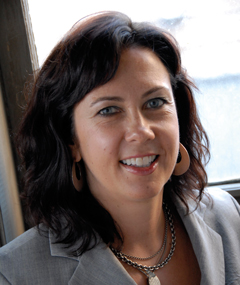Interview with Laura Kray
Professor of Leadership, UC Berkeley Haas School of Business
UC Berkeley’s Women’s Executive Leadership Programme is unique: it was designed by women for women. The programme strikes a perfect balance between evidence-based learning and reality-based knowledge transfer to address the specific strengths and challenges facing women in leadership today. TEBR interviews Professor Laura Kray about Berkeley’s Women’s Leadership Programme and how it is helping to transform organisations and shape women in leadership.
What does Berkeley-Haas see as the key challenges facing women in leadership today?
Women have certainly made substantial gains in the business world, securing top leadership and board positions at Fortune 500 companies. Recently, female leaders like Marisa Mayer of Yahoo, and Sheryl Sandberg of Facebook, have been vocal about the challenges they faced climbing the ranks that sparked a dialogue in the business world about challenges that continue to face women today.
The outspokenness of these super-achieving women also happens to be occurring during an era of unprecedented emphasis within the scientific community on issues surrounding women in business. One pervasive and persistent challenge is gender bias resulting from outdated stereotypes. Numerous studies conducted across business and academia consistently find that study participants rank female leaders lower than their male counterparts in areas such as competence and leadership ability – even if the qualifications between a male and female leader are the same. It doesn’t stop at the level of subjective perceptions; it translates into differences in treatment, advancement, pay, and job satisfaction.
The key challenge is transforming workplaces to value feminine forms of power and leadership as much as their masculine forms. Business, and society more broadly, stand to benefit by adopting a more ambidextrous approach to leadership: competition and cooperation, dominance and relationship building, innovation and sustainability. It is about appreciating “me” as much as “we”. We need more women in the leadership circle to achieve these ends.
What role do you see Executive Education playing in challenging these issues?
On an individual level, the first step is awareness and analysis of issues and barriers. In our Women’s Executive Leadership programme we build this learning early into the programme, and then focus on areas in which female leaders can leverage their unique strengths and advantages, to create an empowering plan of action to advance to new levels of success.
On a broader level, numerous research reports that companies with gender equity amongst leadership and a diverse workforce tend to perform better. Some companies – IBM, for example – excel at developing and promoting female leaders, while other companies struggle. By partnering with companies, particularly in the traditionally male-dominated tech industry, Executive Education programmes like UC Berkeley can help companies develop a set of frameworks and talent management solutions that advance diversity and female leadership, and level the playing field for both male and female leaders.
How is Berkeley-Haas’s Executive Education responding to the need for greater gender diversity at the leadership and board level?
Berkeley Executive Education recognises the competitive advantage for companies that emphasise diverse talent management. Berkeley is a strategic partner to numerous companies in Silicon Valley through which we deliver high-impact leadership accelerator programmes.
We are preparing emerging leaders to define tomorrow’s workplace so that it better reflects the values, needs, and aspirations of a diverse set of 21st century stakeholders. We live in a time of unprecedented change and our programmes are designed to enable women’s voices to be heard.
For example, last year, UC Berkeley led an executive programme exclusively for female academic leaders in Saudi Arabia. The programme was the first of its kind, held at the King Abdullah University of Science and Technology. The goal of the programme was to provide specialised leadership training for highly accomplished women in their fields of expertise. The programme curricula covered individual leadership training, influence and negotiation, leading teams, design thinking, and innovation management taught by Berkeley Haas faculty. This was a tremendous opportunity to be able to advance the impact and individual power for women leaders in Saudi Arabia.
Tell us a little more about the learning environment that Berkeley-Haas’ Women’s Executive Leadership Programme offers?
The Women’s Executive Leadership programme creates an optimal learning environment for women leaders. It gives attendees the opportunity to break from their day-to-day norm to be in a leadership environment surrounded by their peers facing similar challenges. Participants leave the programme feeling that above all, they’ve gained a new level of confidence and a greater sense of ownership over their potential.
What makes this programme unique and innovative?
The programme is unique in that it was designed by women for women. Top Berkeley-Haas faculties are drawing from cutting-edge research and decades of work in the field to address specific strengths and challenges facing women today. The programme really provides women with a unique experience to be surrounded by other top calibre female talent like them (yet different from them as well, yielding a diverse set of perspectives), whereas in corporate halls and boardrooms, they may be in the minority. In addition to the academic strength of the instruction, the programme incorporates high-ranking female guest speakers from top Silicon Valley companies. The programme strikes the perfect balance between evidence-based learning and reality-based knowledge transfer.
Tell me about Berkeley-Hass Executive Education’s vision of the “Innovative Leader”; what characteristics does she embody?
Innovative leaders are visionary, well-networked, empathetic, adaptable, observant, and supportive of their teams. They embody the Haas defining principles to challenge the status quo, possess confidence without attitude, think beyond themselves, and be lifelong learners.
From your experience in the field of executive education, what advice would you give to women managers and leaders aspiring to gain more authority in a male-dominated corporate environment?
Be authentic. Inside of you resides a wealth of knowledge waiting to surface. Trust in your own knowledge, experience and accomplishments; don’t play into “imposter syndrome.” You have what it takes. Find strong mentors, and support other female colleagues. Work smart to make the world a better, safer, fairer place.
 Laura Kray is a Professor of Leadership at Haas School of Business, University of California, Berkeley. She holds a doctorate in Psychology from the University of Washington and has been on the Berkeley faculty since 2002. Kray has published over 30 articles in leading journals on topics pertaining to gender and negotiations, and how counterfactual thinking (reflections on the past of “what might have been”) influence creativity, analytical problem solving, learning from experience, and the creation of meaning in personal narratives.
Laura Kray is a Professor of Leadership at Haas School of Business, University of California, Berkeley. She holds a doctorate in Psychology from the University of Washington and has been on the Berkeley faculty since 2002. Kray has published over 30 articles in leading journals on topics pertaining to gender and negotiations, and how counterfactual thinking (reflections on the past of “what might have been”) influence creativity, analytical problem solving, learning from experience, and the creation of meaning in personal narratives.
Learn more at: www.executive.berkeley.edu



































